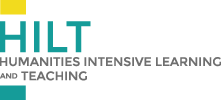Courses 2018 · PA
- Advocacy by Design
- Collections as Data
- Connecting Digital Humanities to Public Audiences [CANCELED]
- Developing Black Digital Humanities Initiatives
- Digital Methods for Interdisciplinary Cultural Studies
- Digital Surrogates: Representation, Engagement, and Meaning
- Help! I’m a Humanist! — Humanities Programming with Python
- Spaces and Stories in the Black Public Humanities
- Text Analysis
Instructors
-
Warning: Undefined variable $page_object in /home/dhtraining/public_html/hilt/wp-content/themes/hilt-child/single-hilt_course.php on line 84
-
Brandon Locke
Project Manager for Library Publishing Workflows Educopia Institute
-
Lauren Tilton
Assistant Professor of Digital Humanities University of Richmond
Description
Note: This course is at capacity and is no longer accepting additional registrations.
How can we transform cultural artifacts, including texts, images, film, and objects into data in productive ways? How do we create, clean, organize, and analyze cultural data without losing its context and meaning? How do emerging digital methods challenge, augment, or complicate cultural studies as they are currently practiced in different disciplines? How do we select, develop, and/or communicate our “digital methods” of cultural data to one another? What counts as “productive” data in cultural studies? How do we understand digital cultural studies as an interdisciplinary endeavor?
In Digital Methods for Interdisciplinary Cultural Studies, we will begin by considering how traditional concepts of “primary”, “secondary”, and “tertiary” sources can be studied individually or at scale. We will explore approaches to (1) finding, evaluating, and acquiring (2) cleaning and preparing (3) exploring (4) analyzing (5) visualizing, and (6) communicating and sharing data. We will discuss the iterative nature of data preparation, the challenges of working with data of different scales or types (e.g. “dense”, “complex”, “big”, “mixed”, “problematic” etc.), as well as how decisions about methodology, tool selection, and data representation can shift according to one’s goals. Emphasis will also be placed on how to manage an emerging digital research project in such a way that helps to ensure that your project remains accessible, that the process is well documented, and that the data is/are reusable.
This course is intended to be an introductory course, and no prior technical experience or knowledge is expected. Readings will be provided to help assist participants in core concepts, methods, and decision making. Participants are welcomed to bring their own data with them that they might want to discuss during class.
Location
Room 625 & 626 Kislak Center, Van Pelt-Dietrich Library

